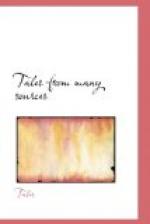But still Miss Betty did not touch the bairn. She was not accustomed to children. But the parson had christened too many babies to be afraid of them, and he picked up the little fellow in a moment, and tucked the yellow rag round him, and then addressing the little ladies precisely as if they were sponsors, he asked in his deep round voice, “Now where on the face of the earth are the vagabonds who have deserted this child?”
The little ladies did not know, the broom bushes were silent, and the question has remained unanswered from that day to this.
There were no railways near Lingborough at this time. The coach ran three times a week, and a walking postman brought the letters from the town to the small hamlets. Telegraph wires were unknown, and yet news travelled quite as fast then as it does now, and in the course of the following morning all the neighbourhood knew that Miss Betty had found a baby under a broom bush, and the lawyer called in the afternoon to inquire how the ladies found themselves after the tea party at Mrs. General Dunmaw’s.
Miss Kitty was glad on the whole. She felt nervous, but ready for a renewal of hostilities. Several clinching arguments had occurred to her in bed last night, and after hastily looking up a few lines from her common-place book, which always made her cry when she read them, but which she hoped to be able to hurl at the lawyer with a steady voice, she followed Miss Betty to the drawing-room.
It was half a relief and half a disappointment to find that the lawyer was quite indifferent to the subject of their late contest. He overflowed with compliments; was quite sure he must have had the worst of the argument, and positively dying of curiosity to hear about the baby.
The little ladies were very full of the subject themselves. An active search for the baby’s relations, conducted by the parson, the clerk, the farm-bailiff, the constable, the cowherd, and several supernumeraries, had so far proved quite vain. The country folk were most anxious to assist, especially by word of mouth. Except a small but sturdy number who had seen nothing, they had all seen “tramps,” but unluckily no two could be got together whose accounts of the tramps themselves, of the hour at which they were seen, or of the direction in which they went, would tally with each other.
The little ladies were quite alive to the possibility that the child’s parents might never be traced, indeed the matter had been constantly before their minds ever since the parson had carried the baby to Lingborough, and laid it in the arms of Thomasina, the servant.
Miss Betty had sat long before her toilette-table that evening, gazing vacantly at the looking-glass. Not that the reflection of the eight curl-papers she had neatly twisted up was conveyed to her brain. She was in a brown study, during which the following thoughts passed through her mind, and they all pointed one way:




